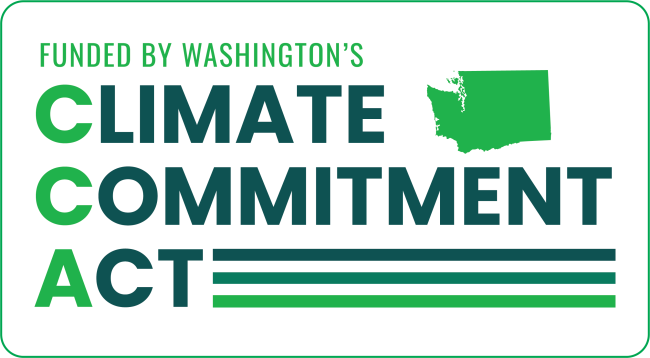Transportation Demand Management Grants
Commute trip reduction grants are for local jurisdictions to reduce greenhouse gas emissions and keep the busiest commute routes flowing. Local jurisdictions work with employers, who develop and manage their own programs based on locally adopted goals.
This grant is supported by state funding from Washington’s Climate Commitment Act (CCA) (34.8 percent). The CCA supports Washington’s climate action efforts by putting cap-and-invest dollars to work reducing climate pollution, creating jobs, and improving public health. Information about the CCA is available at www.climate.wa.gov.
This grant is also supported by funding from the Multimodal Account (65.2 percent).

These programs help more commuters ride transit, carpool, vanpool, walk, bicycle and telework. The grants support more than 1,000 worksites and more than 500,000 workers statewide. These workers left about 22,000 cars at home every weekday and outperformed the state and national averages for options other than driving alone. Eligible jurisdictions and the funding formula were determined by the state's Transportation Demand Management Technical Committee (also known as the Commute Trip Reduction Board) in consultation with other stakeholders.
Awards
The table below lists 26 projects awarded $6.6 million in state funding during the 2023-2025 biennium.
|
Organization |
County |
Award |
|---|---|---|
| City of Auburn | King | $80,900 |
|
City of Bellevue |
King |
$478,200 |
| City of Burien | King | $31,300 |
| City of Des Moines | King | $31,300 |
|
City of Everett |
Snohomish |
$164,600 |
|
City of Federal Way |
King |
$49,900 |
|
City of Issaquah |
King |
$56,100 |
|
City of Kent |
King |
$161,600 |
| City of Kirkland | King | $89,400 |
|
City of Redmond |
King |
$304,400 |
|
City of Renton |
King |
$155,400 |
|
City of SeaTac |
King |
$105,700 |
|
City of Seattle |
King |
$1,459,100 |
| City of Shoreline | King | $43,700 |
|
City of Tacoma |
Pierce |
$167,800 |
|
City of Tukwila |
King |
$93,300 |
|
City of Vancouver |
Clark |
$391,900 |
| City of Woodinville | King | $31,300 |
|
King County Metro |
King |
$37,900 |
|
Kitsap Transit |
Kitsap |
$230,700 |
|
Pierce County Planning and Public Works |
Pierce |
$299,700 |
|
Snohomish County Public Transit Benefit Area Corp. |
Snohomish |
$374,200 |
|
Spokane County |
Spokane |
$651,100 |
|
Thurston Regional Planning Council |
Thurston |
$750,600 |
|
Whatcom Council of Governments |
Whatcom |
$168,600 |
|
Yakima Valley Conference of Governments |
Yakima |
$212,300 |
Sign up for grant updates
To stay informed about WSDOT public transportation grants, you can register in GovDelivery.
Slow down – lives are on the line.
Excessive speed was a top cause of work zone collisions in 2024.
Phone down, eyes up.
Work zones need our undivided attention.
It's in EVERYONE’S best interest.
96% of people hurt in work zones are drivers, their passengers or passing pedestrians, not just our road crews.
